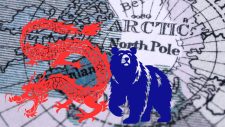Science & Innovation Security
The Institute for Security and Development Policy (ISDP) aims to address critical issues surrounding science and innovation security in the context of rising geopolitical tensions and the malign challenges posed by, among others, the People’s Republic of China (PRC), Iran and Russia.
Recognizing the intricate relationship between technological advancement and national security, ISDP focuses on the securitization of innovation, critical technology, intellectual property protection, and technology transfer, specifically emphasizing the vulnerabilities associated with collaborative research efforts between democratic nations and, especially, PRC. Considering this issue, ISDP will conduct comprehensive studies on knowledge transfer methods, assess critical technology vulnerabilities, and explore the implications of academic collaborations that may inadvertently facilitate the commercialization or weaponization of research. By fostering international cooperation, not least transatlantic, engaging diverse stakeholders, and hosting strategic initiatives such as conferences, workshops, and training programs, ISDP seeks to enhance awareness and understanding of these issues, ultimately fortifying defenses against potential exploitation of valuable information and ensuring the integrity of scientific endeavors.
Through these efforts, ISDP aims to create a sustainable foundation for ongoing dialogue and collaboration between the US and EU, and likeminded nations, particularly in the Nordic and Baltic regions, increasingly becoming focal points for technological development and potential threats from malign actors.
Global Challenges and Strategic Context
The contemporary global landscape presents unprecedented challenges for democratic nations seeking to balance openness with security in research and innovation. As technological advancement accelerates at an exponential pace, the traditional boundaries between civilian and military applications have become increasingly blurred, creating new vulnerabilities that transcend national borders. The proliferation of dual-use technologies—from artificial intelligence and quantum computing to biotechnology and advanced materials—has fundamentally altered the risk calculus for democratic societies that have historically thrived on open scientific collaboration.
These challenges are compounded by the rise of strategic competition between major powers, where research and innovation have become key battlegrounds for geopolitical influence. The weaponization of interdependence—where economic, technological, and scientific ties are leveraged for political gain—has forced democratic nations to reconsider their approach to international collaboration. Authoritarian regimes increasingly view research partnerships not merely as scientific endeavors but as opportunities for intelligence gathering, technology transfer, and influence operations that can undermine democratic institutions and values.
Europe finds itself at a particularly dynamic crossroads, facing multifaceted challenges that will fundamentally influence its long-term strategic trajectory and global standing. The confrontation between the EU’s innovative research capacity and the imperative to protect that research will become a defining factor in determining Europe’s role in the global R&D ecosystem. This tension extends beyond mere policy considerations to encompass fundamental questions about the nature of democratic governance in an interconnected yet increasingly fragmented world.
The tension between protecting research and preserving academic freedom is not merely a technical or legal problem, but represents a deeply normative and political challenge that strikes at the heart of democratic values. Critical questions emerge that require urgent attention: Who determines the risk appetite for a society that values both security and openness? Who decides whether research should serve as a geopolitical tool or continue as a peaceful arena for global collaboration? How can democratic legitimacy be maintained when security considerations often require confidential decision-making processes? These questions become even more complex within a decentralized system like the EU, where multiple stakeholders with varying risk tolerances and strategic priorities must find common ground.
Of special importance is ensuring how Europe, along with other democratic states, can maintain technological sovereignty while preserving the collaborative spirit that has historically driven scientific progress. Caught between the technological dominance of the United States and the rising influence of China, Europe has the potential to chart a distinctive third path that leverages democratic values as a competitive advantage. However, this requires careful navigation to avoid becoming subject to either superpower’s strategic imperatives or technological dependencies that could compromise European autonomy.
European Regulatory Frameworks and Institutional Challenges
The transition from global challenges to specific European contexts reveals the complexity of implementing security measures within existing institutional frameworks. The EU has been examining its regulatory frameworks, data protection standards like the GDPR, and inter-EU collaborative research mechanisms, but these efforts have revealed fundamental structural challenges. The EU’s decentralized nature, while a source of democratic legitimacy and cultural diversity, creates significant obstacles to forming robust, unified initiatives that can streamline research security across the entire bloc.
Key issues remain unresolved, creating ongoing vulnerabilities that require immediate attention. These include ensuring academic freedom within academic institutions while effectively managing foreign influence operations, establishing comprehensive ethical AI development policies that can keep pace with technological advancement, and creating mechanisms for rapid response to emerging threats without stifling innovation. The challenge is further complicated by the need to maintain Europe’s attractiveness as a destination for international talent while implementing necessary security screenings and protections.
There is a significant risk that security concerns may dominate policy discussions at the expense of recognizing opportunities and the substantial benefits of international cooperation. Conversely, there is an equally dangerous risk that calls for preserving academic freedom could inadvertently create serious security vulnerabilities. This dual risk requires sophisticated policy responses that can navigate between extremes while maintaining both security and openness.
While harmonization between EU countries represents an important goal, it may be more effective to discuss how differentiated risk management approaches—rather than “one-size-fits-all” solutions—can better support both security objectives and scientific quality. Different member states face varying threat levels, have different research strengths, and possess different institutional capacities for implementing security measures. Similarly, different universities’ needs and capabilities vary considerably, making it challenging to develop universally applicable models that can address the full spectrum of European research institutions.
Expanding the Security Discussion Beyond Technology
The scope of research security discussions must expand beyond the traditional focus on technology transfer and dual-use applications. It is crucial to consider how research security concerns also encompass the humanities and social sciences, fields that are often overlooked in security discussions but represent significant vulnerabilities. These disciplines involve extensive data collection on human behavior, social structures, and cultural patterns that can be exploited for influence operations, social manipulation, and political interference.
Collaboration with authoritarian states in these fields presents unique risks related to data ethics, research methodology, and the potential for academic findings to be misused for surveillance and social control. The challenge is particularly acute in areas such as behavioral psychology, political science, and cultural studies, where research findings can be weaponized to undermine democratic institutions and social cohesion.
Key Questions for Research Security
- How can democratic states strengthen technological sovereignty while remaining globally competitive and maintaining their commitment to international collaboration?
- What role should trade policies, funding mechanisms (such as Horizon Europe), and public-private partnerships play in securing research and innovation without creating barriers to legitimate international cooperation?
- How can democratic states safeguard academic institutions and research hubs from foreign influence while upholding fundamental principles of openness and academic freedom?
- What measures can be implemented to harmonize security policies across member states without disrupting scientific progress or creating bureaucratic obstacles to innovation?




